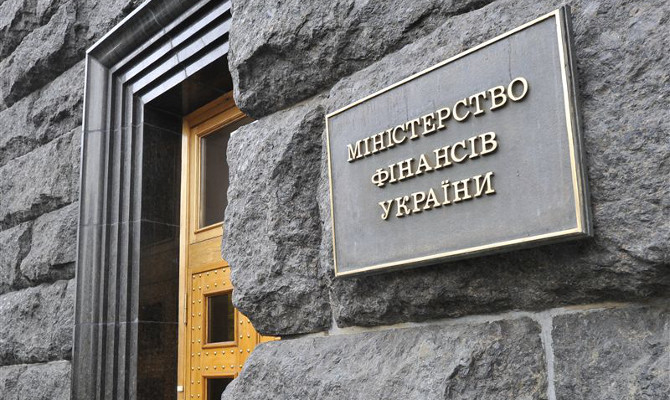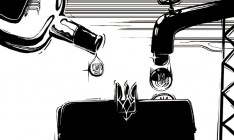Economy
budgetThe Finance Ministry of Ukraine is initiating revision of the national budget 2014 taking into account hryvnia devaluation

The Finance Ministry is planning to renew the parameters of the national budget for the current year. As Capital learned, the ministry headed by Oleksandr Shlapak has drafted a bill on amendments to the national budget 2014, who proposes to increase revenues and expenditures setting them at UAH 376.9 bn and UAH 440.7 bn respectively.
According to the calculations of the Finance Ministry, the government is mainly planning to revise the limit of the national debt by increasing it from UAH 664 bn to UAH 743.7 bn. “Around 60% of Ukraine’s debt liabilities are nominated in foreign currency. Hryvnia devaluation this year from UAH 8/US $1 to UAH 12/US $1 and the continued exchange rate fluctuations do not allow reaching the limit of the national debt envisaged by the budget,” reads the explanatory note to the bill. In view of hryvnia devaluation, the Finance Ministry is proposing to increase expenditures for financing diplomatic structures by UAH 198 mn and for intelligence operations in the defense sector by UAH 37.7 mn. In addition to that, it will require UAH 264.1 mn more for repayment of loans attracted within the framework of preparations for EURO 2012. Another UAH 330.8 mn shall be directed at repayment of those loans attracted for implementation of the Cyclon-4 and Creation of the National Satellite Communications System projects. In its turn, it is proposed that assistance from the European Union within the framework of the State Building Contract in the amount of EUR 250 mn (around UAH 4 bn) be factored into the revenues and expenditures of the special fund.
New authorities for NBU and the Cabinet
Among other things, the Finance Ministry is proposing to grant the Cabinet of Ministers the right to partially compensate interest rates on loans on the domestic market and envisages an additional UAH 439.4 mn in the national budget for these purposes.
According to the bill, the following will be able to use this program: residents of Ukraine (the list and parameters have not been specified yet), public joint stock company UkrHydroEnergo for completion of the first line of the Dniprovska Hydro-Atomic Energy Station, Naftogaz of Ukraine for refinancing of its liabilities, the Agrarian Fund, the R&D Association Fort of the Ministry of Internal Affairs and UkrZaliznytsya structures.
The Cabinet is also planning to reinstate the practice of 2008 by envisaging that the NBU should sustain the liquidity of treasury bills via refinancing or retirement of bonds at their nominal value within five days “upon receipt of the proposal as to their refinancing or retirement”. “This norm violates the principle of independence of the NBU and may raise questions of the International Monetary Fund as it largely obligates the NBU to monetize the national budget deficit,” says Head of the Analytical Department at SP Advisors Vitaliy Vavryshchuk. At the moment, there are practically no sources of covering the deficit except for the issuing of treasury bills, while the demand for them is extremely low. This means the NBU will be forced to finance a large part of the national budget deficit. “In case this norm is adopted the government will gain access to primary resources of the NBU and may become less motivated to conduct an effective budget policy,” says the expert.
The trick did not work
The bill has already been submitted for consideration by the government, says First Deputy Chair of the VR Budget Committee Oksana Kaletnyk (independent). However, later, the Finance Ministry recalled the document for further revision. In fact, as Capital was informed by a source in the Cabinet, the need to additionally cut expenditures of the national budget was one of the reasons why the initial bill was recalled. “As an option, it has been proposed to liquidate all incentives for civil servants – bonuses and markups – and send some state employees on unpaid vacations. With bonuses, the civil servants earned US $150-170 per month on average, while without them their pay will fall to US $100-110,” Kaletnyk told Capital. She believes that if the Cabinet resorts to such a measure it will cause a social explosion, because the government sector has always been one of the most stable in terms of financing.
Head of the State Fiscal Service Ihor Bilous says the government is currently discussing the fulfillment or non-fulfillment of the national budget, including tax and customs proceeds. “Cutting expenditures is imperative. The Finance Ministry is actively working on this. As for budget proceeds, the figures for proceeds from the customs duty seem satisfactory. I believe we will achieve 100% fulfillment of the plan,” said Bilous. He added that fulfillment of the tax proceeds plan depends on how the situation in the eastern oblasts of Ukraine develops, how strongly the goods turnover and transportations will decrease, and also on the size of average receipts and a number of other factors. “With systemic shrinking of the economy it is difficult to speak about an economic wonder,” he emphasized. According to the official data, due to the events in the east of the country the national budget fell short of UAH 2.5 bn in proceeds in June. At that, the losses of the budget from tax and duties shortfalls due to the combat actions in the Donetsk and Luhansk oblasts amounted to UAH 630 mn, which is 1.5 times higher than in May.






 of the agreement of syndication with Financial Times Limited are strictly prohibited. Use of materials which refers to France-Presse, Reuters, Interfax-Ukraine, Ukrainian News, UNIAN agencies is strictly prohibited. Materials marked
of the agreement of syndication with Financial Times Limited are strictly prohibited. Use of materials which refers to France-Presse, Reuters, Interfax-Ukraine, Ukrainian News, UNIAN agencies is strictly prohibited. Materials marked  are published as advertisements.
are published as advertisements.